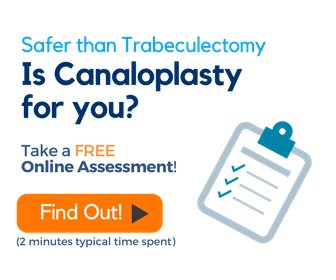Close your eyes for a second. Now imagine this immense darkness for the rest of your life. This lifetime of blindness is what glaucoma does. Glaucoma is a serious medical condition that requires immediate attention, because if left untreated, can lead to permanent loss of sight. It is a silent disease often showing no symptom through the years. Hence, early on, it is important to find out if you or your loved one is at risk of having glaucoma.
Starting middle age, the incidence of glaucoma proportionally increases after40 years old and advancing age. It is also highly prevalent among African-American, African-Caribbean and Hispanic races, who are genetically predisposed to develop glaucoma even at an earlier age, typically as young as those in their 20s to 30’s. Persons who suffer from diabetes and hypertension are also the most vulnerable. Any relative or family member who had glaucoma also poses a high probability of other blood kin of having it.
 If you or someone you know have one or any of the said risk factors, it is absolutely necessary to have a thorough eye examination by a glaucoma specialist who can help look for any physical evidences of glaucoma in your eye. In most cases, glaucoma is diagnosed either by a family physician or an optometrist. These two health professionals will then refer the patient to a glaucoma specialist. A single consult alone will spell the difference of saving or losing your sight. The expertise of a glaucoma specialist cannot be underestimated. A glaucoma specialist for one can determine the specific glaucoma stage you are in, estimate your risk for blindness and decide whether to initiate treatment.
If you or someone you know have one or any of the said risk factors, it is absolutely necessary to have a thorough eye examination by a glaucoma specialist who can help look for any physical evidences of glaucoma in your eye. In most cases, glaucoma is diagnosed either by a family physician or an optometrist. These two health professionals will then refer the patient to a glaucoma specialist. A single consult alone will spell the difference of saving or losing your sight. The expertise of a glaucoma specialist cannot be underestimated. A glaucoma specialist for one can determine the specific glaucoma stage you are in, estimate your risk for blindness and decide whether to initiate treatment.
Although a general eye doctor called an ophthalmologist would know how to manage glaucoma, it is still best to have your eyes taken care of by a glaucoma specialist. It is like having an automotive mechanic repair your car instead of a jack of all trades mechanic. Although glaucoma specialists are also ophthalmologists, their fellowship training for another two to three years in the field of glaucoma, adds an extra feather to their cap and puts them in a better position to effectively treat all cases of glaucoma, from the simple to the most complicated.

It is most crucial to see a glaucoma specialist especially in the earliest stages of the disease, wherein there has yet been no extensive damage to the nerves of the eye. Recent studies show that patients who had early medical or surgical intervention by a glaucoma specialist were least likely to progress to blindness and disability as a result of lowered pressures in the eye.
There are a myriad of new glaucoma treatment available for all types of glaucoma- from drugs, laser, and artificial drainage devices to the minimally invasive glaucoma treatment, Canaloplasty, which you can intelligently discuss the pros and cons of each with your glaucoma specialist.
Related Articles:
- What Is A Glaucoma Specialist?
- How To Choose The Right Glaucoma Specialist For You
- Why Do Some Good Eye Surgeons Not Take Fellowship?
- What Training Is Required To Become An Interventional Ophthalmologist?
- Are all Canaloplasty Surgeons Glaucoma Specialists?
- 10 Things You Must Know Before Choosing Your Glaucoma Surgeon
- Glaucoma Surgeon Insider (Ideally for Eye Surgeons)


